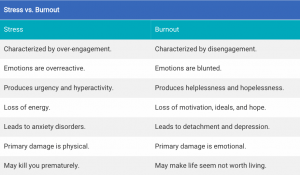With finals just around the corner and stress levels rising, you may be starting to get burnt out. Feeling stressed at times is completely normal, but intensified symptoms of stress over a long period may indicate a more serious issue that you need to pay attention to. So if you feel like you are #stuDYING and need to find your out, here are some helpful tips to identify, remedy and prevent falling into burnout.
What is Burnout?
Burnout involves an absence of motivation, caused by constant exposure to prolonged stress. However, much different from typical daily stress, it is characterised by feelings of emptiness, mental exhaustion and a lack of drive.
Signs of Burnout
1. Emotional Exhaustion
Burnout may cause you to feel constantly fatigued, drained and unable to cope. This often manifests in the lack of energy to get things done.
2. Alienation from work
One experiencing burnout may view their environment as increasingly stressful and frustrating, often due to a lack in results following completed tasks. Developing a cynical worldview, one may start to think negatively of those around them. This causes them to distance themselves from work, causing feelings of numbness to arise.
3. Reduced Performance
Symptoms of burnout mentioned above may start to spill over into daily tasks. One usually has difficulty concentrating and is devoid of creativity and inspiration.
If you feel that you are experiencing these symptoms or are starting to fall into the early stages of burnout, you need to start prioritising your mental health to prevent spiralling into a worsened state.
Preventing and Remedying Burnout
Thankfully, there are ways to rid burnout. You can start by making changes to your work environment to cope with the daily stressors that come your way.
1. Prioritise me time
Although we all know that it is necessary to take the time to care for our bodies, how many of us actually keep to it? Eating healthily, getting exercise, and having enough sleep are imperative to not letting normal stress lead to burnout. Cater for your well-being by adding stress-reducing activities to your weekly routine like yoga, walks or meditation in your own time. Although you may feel like you need to stay cooped in to finish your work ASAP, taking those few hours off might even help to improve your productivity later on.
2. Time Management
Students are less likely to experience burnout if they are able to manage their time effectively. As burnout usually occurs when workload becomes unmanageable, planning your time and keeping track of deadlines can help pace yourself throughout the race towards finals.
3. Realistic Goal Setting
Being unrealistic about goals and your ability to meet them, piling on more courses than you can handle and having a social life that leaves little time for work can be a recipe for disaster. Be realistic about what you can actually achieve and break down huge projects into small attainable tasks that will help you feel a sense of achievement after you complete each one.
4. Disconnect from Social Media
The constant updates and influx of information may be causing you to feel overwhelmed, even if you may not feel it initially. Taking an entire day off social media or remembering to get off your phone one hour before bedtime can not only help you to destress but also aid in promoting restful sleep. Additionally, turning to friends or family members for emotional support when you feel you cannot cope can also be helpful.
Lastly, take a deep breath – you’re going to be just fine. It’s alright to feel a little overwhelmed sometimes. Take a breather if you have to and then hustle on. All the best for exam season, you can do it!


